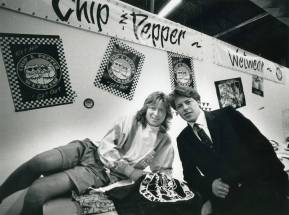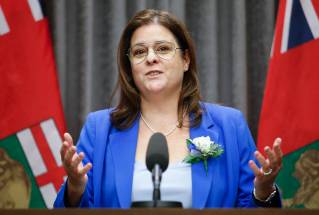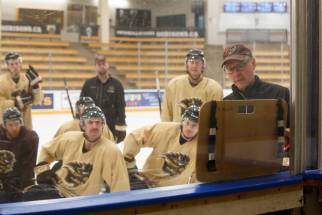Challenges, obstacles face Winnipeg Transit in 2023
Read this article for free:
or
Already have an account? Log in here »
To continue reading, please subscribe:
Monthly Digital Subscription
$0 for the first 4 weeks*
- Enjoy unlimited reading on winnipegfreepress.com
- Read the E-Edition, our digital replica newspaper
- Access News Break, our award-winning app
- Play interactive puzzles
*No charge for 4 weeks then price increases to the regular rate of $19.00 plus GST every four weeks. Offer available to new and qualified returning subscribers only. Cancel any time.
Monthly Digital Subscription
$4.75/week*
- Enjoy unlimited reading on winnipegfreepress.com
- Read the E-Edition, our digital replica newspaper
- Access News Break, our award-winning app
- Play interactive puzzles
*Billed as $19 plus GST every four weeks. Cancel any time.
To continue reading, please subscribe:
Add Free Press access to your Brandon Sun subscription for only an additional
$1 for the first 4 weeks*
*Your next subscription payment will increase by $1.00 and you will be charged $16.99 plus GST for four weeks. After four weeks, your payment will increase to $23.99 plus GST every four weeks.
Read unlimited articles for free today:
or
Already have an account? Log in here »
Hey there, time traveller!
This article was published 04/01/2023 (1067 days ago), so information in it may no longer be current.
Starting a new job always brings an elevated level of stress, expectation and apprehension.
There are processes to be learned, relationships to be cultivated and goals to be set and accomplished. There’s also generally a level of excitement and anticipation that, while positive in its manifestation, still compounds the overall stress the first few weeks on the job bring.
For Chris Scott, the burden must feel particularly weighty.
As the new head of the Amalgamated Transit Union Local 1505, Mr. Scott begins his three-year leadership term at a time when Winnipeg Transit is facing critical safety issues and customer-service concerns that have stymied its recovery from a catastrophic pandemic-induced decline in ridership.
Despite ambitious intentions by city administration to expand the bus rapid-transit network and continuing pledges to make public transit safer for staff and users and more reliable for all who depend on it, Winnipeg Transit seems unable to shift public perceptions in a way that will increase the number of Winnipeggers willing to make transit a primary transportation choice.
Winnipeg Transit is very much at a crossroads, at the same time the city itself is an existential crisis rooted in the eternal debate over the cost of urban sprawl.
What Transit becomes in the next five years will play a big part in defining Winnipeg as it grows inevitably toward the one-million population mark.
While safety and customer service loom large as public concerns about transit, the union boss’s first order of business will be negotiating a new collective agreement with the city. The current contract expires in less than a week.
“Safety has really become the biggest issue,” said Mr. Scott, who joined Winnipeg Transit as an operator in 1999. “I never thought when I started that there would be a requirement for shields or the discussion of a security force or police (patrolling buses), but … these are now serious discussions that have to be had.”
The past year has seen an unprecedented rise in assaults on Transit drivers, as well as high-profile incidents in which passengers were endangered and/or injured. Mr. Scott says addressing safety, as well as such issues as fare evasion and the inability of buses to maintain scheduled service, requires bottom-line support to relieve Winnipeg Transit’s continued underfunding.
He’s right. But any demand that the city commit more funding to its public-transit system must be tempered by a recognition of the broader budgetary plight in which civic government is mired, and an acknowledgement of the Progressive Conservative government’s abrupt abandonment in 2017 of decades-old 50-50 civic/provincial funding formula for transit.
’I never thought when I started that there would be a requirement for shields or the discussion of a security force or police (patrolling buses), but … these are now serious discussions that have to be had.’– Chris Scott, new head of Amalgamated Transit Union Local 1505
While it’s true the current provincial government last year announced an injection of cash to help cover pandemic-induced shortfalls, the city’s transit system remains in a precarious financial state, which has exacerbated staffing shortages and compounded the logistical issues that result in customer complaints regarding frequency and reliability of service.
Transit’s core issues, and the manner in which they can best be addressed, must be clearly and loudly articulated. Mr. Scott, who defeated incumbent president Romeo Ignacio in the ATU’s December leadership election, seems inclined to think he’s the person who can make Transit staff’s collective voice heard.
“The squeaky wheel gets the grease, right?” Mr. Scott explained “There’s a point when you have to go beyond co-operation in order to become productive.”
A firmer hand on the leadership wheel might be what ATU members desire, but the most important consideration remains making the wheels on the buses go ’round in a way that inspires Winnipeggers it’s safe and smart to climb aboard.









